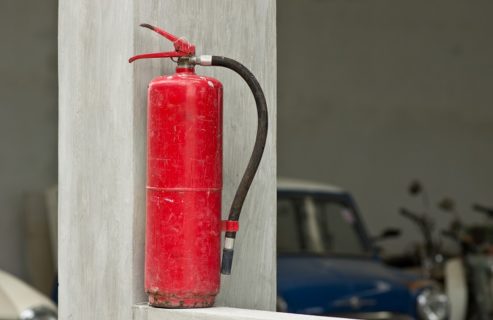According to Acuity’s internal data, fire is one of the most common claims for auto repair shops. Unfortunately, fire also causes some of the most expensive claims. Protecting your shop against fire is a great place to start when looking to reduce the likelihood of a major claim in your shop.
To bring you some fire safety tips, I collaborated with Scott Leistner, one of Acuity’s loss control representatives. Scott has more than 20 years of experience in assisting automotive repair, manufacturing, and supply businesses with loss control. He works with these businesses to develop risk improvement solutions, including those aimed at fortifying fire protection practices.

Here are a few of Scott’s tips for reducing the risk of fire in your shop:
1.A clean shop is a safe shop. Maintain a high level of housekeeping at all times, removing trash and waste daily and cleaning up oil spills immediately using absorbent materials. Discard all oily rags in metal storage containers with self-closing lids to reduce the likelihood of spontaneous combustion.
2.Store wisely. Effective storage practices help prevent fires. Store flammable and combustible liquids in approved flammable liquid storage cabinets and keep all combustibles away from heating sources like furnaces and hot water heaters. Store tires separately, away from all flammables and potential ignition sources. Finally, do not allow temporary storage to block access to fire extinguishers and other fire prevention equipment.
3.Practice proper use of electrical equipment. Ensure all electrical equipment and tools are properly grounded and immediately discontinue use of and remove any damaged electrical equipment. Inspect and maintain battery charging equipment and keep combustibles far away from it. Only use extension cords if needed and make sure they are in good condition. Avoid using portable electric space heaters.
4.Guard against fire from special hazard shop exposures. Always spray paint in an approved spray booth equipped with automatic fire-suppression equipment. Implement effective hot work procedures to prevent sparks from igniting combustibles during cutting and welding work. Inspect hydraulic lifts for leaks and repair immediately if a leak is present. Keep solvent tanks clean and maintained and make sure the lid closes securely.
5.Develop and implement formal policies and programs for fire prevention. Train staff in proper use of fire extinguishers and enforce a no-smoking policy. Conduct weekly self-inspections, correcting any hazards found in inspection, and practice daily housekeeping and clean-up duties. Schedule regular preventive maintenance of HVAC and fire-protection systems.
At Acuity, we offer expert loss control services to our business policyholders at no extra charge. Our loss control representatives are safety and insurance professionals who have college degrees, technical certifications, and an average of 25 years of experience in the field. These representatives partner with our customers to minimize risk of future losses by assisting with safety and loss prevention initiatives.
Posted by Paige N. on October 17, 2018 in Mechanic

